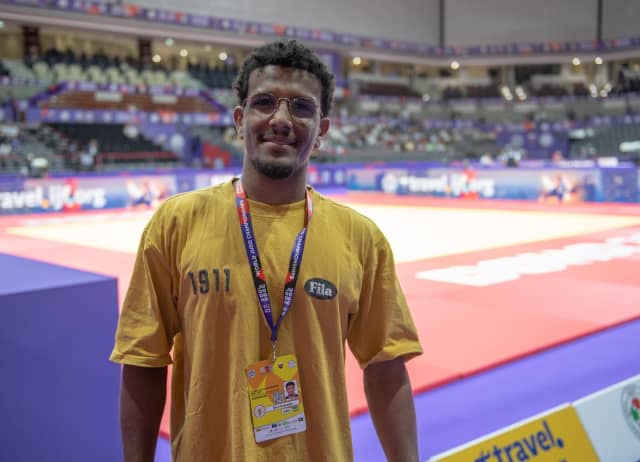“We have a very small federation with just 150 judoka holding federation licences. When I took up my role, that number was about half. We have a large refugee population and at the moment we have plans to create programmes for them and by the end of this year it will be a working programme. This kind of development work is not reserved only for children but for all people.”
Leon is a source of inspiration for the younger judoka, showing them that travel, improvement and international ambition are all permitted.
“I think the country’s best result was with me in Tunis this year, 5th place.” Leon is juggling, expertly, still training hard to earn the results he aims at while constantly striving for the rest of the country’s judoka to follow and to aim high.
“We promote Judo in Schools and put judo into the police too, like a police judo club. We also have some judo in the military. The federation was only established fourteen years ago and so we are young.” This is like a blank canvas for Léon, for him to be able to paint a whole new picture of Rwandan judo and the government is behind him.
“We had one athlete compete in London at the Olympic Games, through the wild card system. That’s a big source of pride and now we are working towards qualifying one place for the Los Angeles 2028 Games, directly. That’s the aim.
It’s not normal for an athlete to be in a position like mine within the federation but we are such a small number of people that it works best this way, for now. I hope to really lead from the front and show all our judoka that dreams can become reality. Im working to be able to prticioate in future world championships, maybe in 2025, and show the young ones that it is possible.
Right now we have a handful of coaches for Judo in Schools and one of them, from Congo, has the IJF Academy level 1 qualification. He was in Turkiye with the Academy. All our coaches are black belts but our federation is still working towards creating in-house grading structures, to keep standard up but also be self-sustaining. Most coaches are working in Rwanda but are from other countries.
At this time we have no national team, as such, as everything is in the development phase. I’m the only athlete heading to international competitions. I have a coach from Switzerland and we managed to gain some sponsorship through his contacts. This allowed me to travel to Doha along with our federation president Christian Bishyka. We learned a lot being there, attending the Congress as a delegate and then staying for the World Championships - Doha 2023. I’m learning first hand what the top level is really like. To watch, as an athlete, was an incredible experience. I have learned a lot about the mentality of competitors here, it’s really a different level.
At the IJF Congress we spoke about development and opportunities and I saw similarities between projects spoken about there and the way we have structured our own action plan. This is very positive and gives us confidence to continue on our line. We have also been able to make good connections with other federations.
Rwanda might not be the first country to come to mind when thinking about African judo nations but they are happy to be patient, knowing that they are laying a strong foundation for growth and excellence and all within an ethos which respects the core principles for the sport, mutual welfare being right at the top of the list.
Morocco showed the whole world that the African nations are not to be discounted. They changed the world’s expectations at the World Championship Mixed Team Event in Doha, beating Greece, Austria and Romania on their way to Africa’s first ever medal match at world level. The team placed 5th and earned a seat at the table, being an example for any developing country. Rwanda was there to see it and now they’re getting back to work, knowing that everything lies ahead of them.





